英语意群、重读、弱读、连读、爆破和语调备课讲稿
英语句子重音、语调、连读、弱读、爆破及意群 教学PPT

• He ‘isn’t a tech ‘nician.
• 3. be用在一般疑问句句首时,重读与否均可: • ‘Is he a ‘worker? • Is he a ‘worker?
• 比较句中的重音 • 在比较句中,重音落在as或than后的代(名)词上: • This is better than ‘that. • John is taller than ‘Bill. • She’s as happy as a ‘lark. • He’s as sly as a ‘fox.
• You were trying, ‘weren’t you? Yes, I ‘was.
• 2. 助动词、情态动词和be动词与not连成一词时要重读:
• She ‘doesn’t ‘like the ‘weather here.
• I ‘can’t ‘speak ‘French。
• They ‘aren’t ‘waiting for us.
Note
如果前词尾辅音与后词尾辅音相同,前辅
音省略。
I was× so happy. I have got× to go. →I have gotta go.(to轻音化为ta) Do~you want× to dance? →do you wanna dance?
(to轻音化为na)
Note
以辅音结尾的单词 + h开头的单词,h不发
in an hour pick it up an hour and a half let him in
A group of people put on their coats and went out.
2.“辅音+半元音”
i. 英语语音中的/j/和/w/是半元音,如果前一个词是 以辅音结尾,后一个词是以半元音,特别是/j/开头, 此时也要连读。
英语句子重音、弱读、语调、连读、及意群
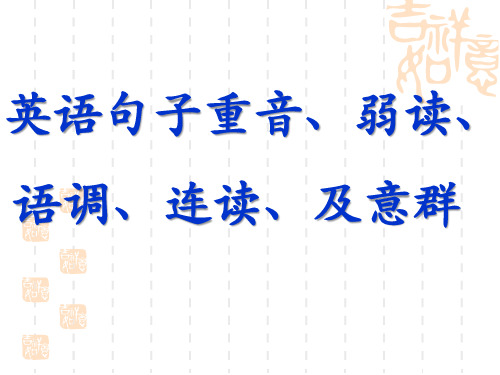
▪ 用于陈述句
降调
▪ I have already read that book. ↘
▪ That street is two miles long. ↘
▪ 用于特殊疑问句 ▪ What has happened to him? ↘ ▪ Which direction is it to the post office? ↘ ▪ 注意:特殊疑问句有时可用升调表示请别人重复刚说过的话: ▪ What is your major? ↗ ▪ Where shall we go for the holiday? ↗
不可连读的情况
当短语或从句之间按意群进行停顿时,意群与意 群之间即使有两个相邻的辅音与元音出现,也不 可连读。
▪ 9) you /jə/ ▪ What do you think?
▪ 10) your /jə/ ▪ Take your time.
▪ 11) us /əs/ ▪ Let us think it over.
▪ 12) that /ðət/ ▪ This is the house that Jack built.
maybe even good enough to come up with the next
iPhone
keeps us from turning a blind eye to corruption and to
injustice
2.“辅音+辅音”
爆破音/p/,/b/,/t/,/d/,/k/,/g/ 和摩擦音/f/,/v/,/W/, 其中任意2个相临时,前一个音会轻音化,即由相关的发音器官 做好这个发音的姿势,稍做停顿后即发后面的音。 如果这些音 在词尾,也要轻音化。
job.
英语意群、重读、弱读、连读、爆破和语调
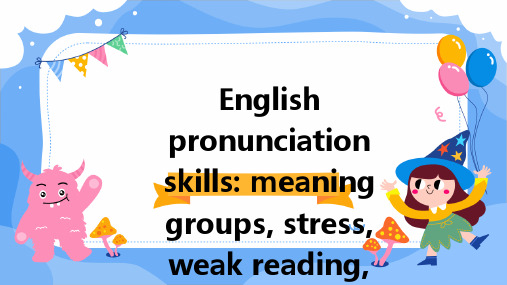
02
This technique helps to improve fluency and naturalness in speech by reducing the effort required to pronounce unstressed vowels clearly.
03
Weak reading can also enhance listeners' understanding by reducing the amount of information they need to process, as unstressed vowels often do not carry as much meaning as stressed vowels.
Meaning groups are typically separated by pauses, which help to clarify the structure and meaning of the sentence.
Classification and application of pauses
04
Linking skills
The definition and function of connected reading
Relationships
Both stress and weak reading are important pronunciation skills that contribute to clear and effective communication in English. They work together to create rhythm and intonation in speech, with stress adding emphasis and weak reading reducing effort and improving fluency.
英语意群重读弱读连读爆破和语调77697

升调
用于一般疑问句 Do you mind if I sit here? ↗ Can you hand in your compositions today? ↗ 注意:一般疑问句有时也可用降调,表示一种不
and English. ↘
用于陈述句,表示疑问、怀疑、未定、猜测或期待等 Your really want to do it? ↗ She might have gone. ↗ I think so. ↗
用于置于句首的状语短语或状语从句 After dinner ↗, I read a magazine and made telephone
语调
英语语调主要有降调、升调和平调三大类。 不同的语调可以表示说话人不同的态度和
不同的隐含意思。 英语中同一句话采用不同的语调会产生截
然不同的语意概念。如“Yes”。 语调具有强烈的感情色彩,它使语言更富
有表现力。
用于陈述句
降调
I have already read that book. ↘
That street is two miles long. ↘
用于特殊疑问句 What has happened to him? ↘ Which direction is it to the post office? ↘ 注意:特殊疑问句有时可用升调表示请别人重复刚说过的话: What is your major? ↗ Where shall we go for the holiday? ↗
英语意群重读、弱读、连读爆破和语调PPT课件

▪ You were trying, ‘weren’t you? Yes, I ‘was.
▪ 2. 助动词、情态动词和be动词与not连成一词时要重读:
▪ She ‘doesn’t ‘like the ‘weather here.
▪ I ‘can’t ‘speak ‘French。
▪ They ‘aren’t ‘waiting for us.
▪ John is taller than ‘Bill.
▪ She’s as happy as a ‘lark(白灵鸟).
▪ He’s as sly as a ‘fox.
9
逻辑重音
▪ 句子的重音总是要表现说话人的思想和他 所要表达的意思的重点。有时为了强调, 句子中几乎任何词都可以有句子重音,包 括一些通常没有句子重音的词,这种依说 话者意图重读的音就是逻辑重音。
▪ Must I ‘stick it ‘on my’self?
▪ Must I ‘stick it on my’self?
在连贯的话语中,不可能所有的词都同样重要,
必然有些词较为关键,有些词则相对次要一些。
一般来说,关键词需要重读,这就是句子重音,
而其他词则不必重读。
5
Note
▪ 名词、实义动词、形容词、副词、数 词、指示代词、疑问词和感叹词等一 般都重读。
▪ He ‘isn’t a tech ‘nician.
8
▪ 3. be用在一般疑问句句首时,重读与否均可:
▪ ‘Is he a ‘worker?
▪ Is he a ‘worker?
▪ 比较句中的重音
▪ 在比较句中,重音落在as或than后的代(名)词上:
▪ This is better than ‘that.
英语意群、重读、弱读、连读、爆破和语调精编版

语调
▪ 英语语调主要有降调、升调和平调三大类。 ▪ 不同的语调可以表示说话人不同的态度和不
同的隐含意思。 ▪ 英语中同一句话采用不同的语调会产生截然
不同的语意概念。如“Yes”。 ▪ 语调具有强烈的感情色彩,它使语言更富有
表现力。
▪ 用于祈使句 ▪ Go back to your seat! ↘ ▪ Please do not hesitate to contact me. ↘
calls. ↘ ▪ While you were writing letters ↗, I was reading a book. ↘ ▪ 用于并列句的第一个分句,表示句子还未说完 ▪ My fever is gone ↗, but I still have a cough. ↘ ▪ My major is English ↗, and I like it. ↘ ▪ 用于委婉祈使句 ▪ Excuse me, sir ↗. Can you help me? ↗ ▪ 用于称呼语 ▪ Mrs. Smith ↗, this is Tom Jones. ↘
▪ 用于罗列中最后一项之前的各项 ▪ For each incomplete sentence, there are four
choices marked A↗, B↗, C↗, and D. ↘ ▪ We study Chinese ↗, history ↗, geography ↗,
and English. ↘
[z] + [j] → [З ]
How was~your vacation? He says~you’re good.
3.“元音+元音”
如果前一个词以元音结尾,后一个词以元音开头,这 两个音往往也要自然而不间断地连读到一起。
英语意群重读弱读连读爆破和语调课件
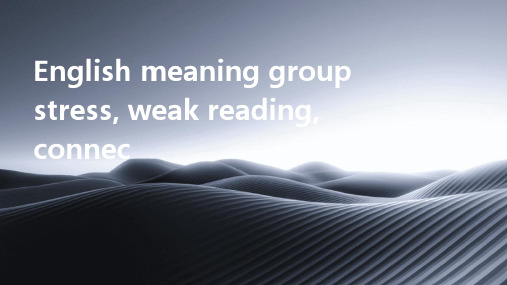
The stressed syllable in an explosion should be pronounced with a louder volume and a more distinct pronunciation, while the unstressed syllables should be pronounced more softly and faintly.
03
Weak reading is an essential part of English intonation and pronunciation training, and is widely used in language teaching and learning materials.
There are four types of intonation in English: falling intonation, rising intonation, level intonation and climbing intonation.
Types
The function of intonation is mainly to express the attitude, emotion and intention of the speaker, and help to distinguish the meaning of the same words and sentences. For example, when we want to express a question, we usually use rising intonation; when we want to express a command or request, we usually use falling intonation.
如何正确的说英语:重音、连读、爆破、弱化、意群停顿
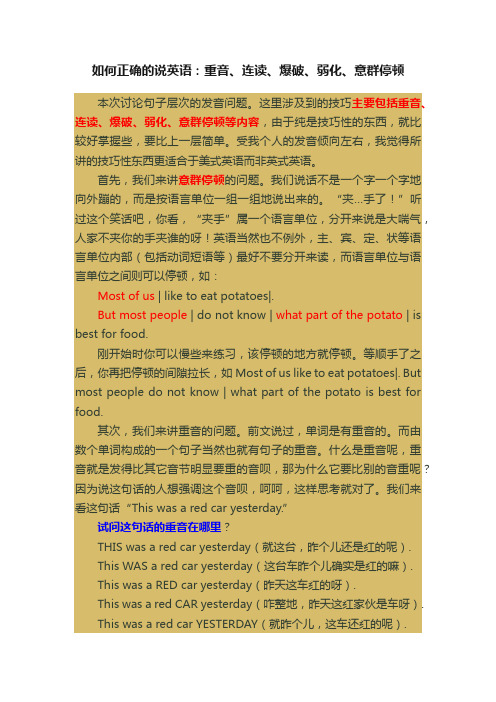
如何正确的说英语:重音、连读、爆破、弱化、意群停顿本次讨论句子层次的发音问题。
这里涉及到的技巧主要包括重音、连读、爆破、弱化、意群停顿等内容,由于纯是技巧性的东西,就比较好掌握些,要比上一层简单。
受我个人的发音倾向左右,我觉得所讲的技巧性东西更适合于美式英语而非英式英语。
首先,我们来讲意群停顿的问题。
我们说话不是一个字一个字地向外蹦的,而是按语言单位一组一组地说出来的。
“夹…手了!”听过这个笑话吧,你看,“夹手”属一个语言单位,分开来说是大喘气,人家不夹你的手夹谁的呀!英语当然也不例外,主、宾、定、状等语言单位内部(包括动词短语等)最好不要分开来读,而语言单位与语言单位之间则可以停顿,如:Most of us | like to eat potatoes|.But most people | do not know | what part of the potato | is best for food.刚开始时你可以慢些来练习,该停顿的地方就停顿。
等顺手了之后,你再把停顿的间隙拉长,如Most of us like to eat potatoes|. But most people do not know | what part of the potato is best for food.其次,我们来讲重音的问题。
前文说过,单词是有重音的。
而由数个单词构成的一个句子当然也就有句子的重音。
什么是重音呢,重音就是发得比其它音节明显要重的音呗,那为什么它要比别的音重呢?因为说这句话的人想强调这个音呗,呵呵,这样思考就对了。
我们来看这句话“This was a red car yesterday.”试问这句话的重音在哪里?THIS was a red car yesterday(就这台,昨个儿还是红的呢).This WAS a red car yesterday(这台车昨个儿确实是红的嘛).This was a RED car yesterday(昨天这车红的呀).This was a red CAR yesterday(咋整地,昨天这红家伙是车呀).This was a red car YESTERDAY(就昨个儿,这车还红的呢).呵呵,都有可能啊!语言学书上说,人说的话里包含有新信息(他想说的而别人还不知道的)和旧新息(他说过的而别人已知道的)之分,从这个角度讲,句子的重音通常是落在新信息上。
英语的连读、重读、弱读、爆破音讲解
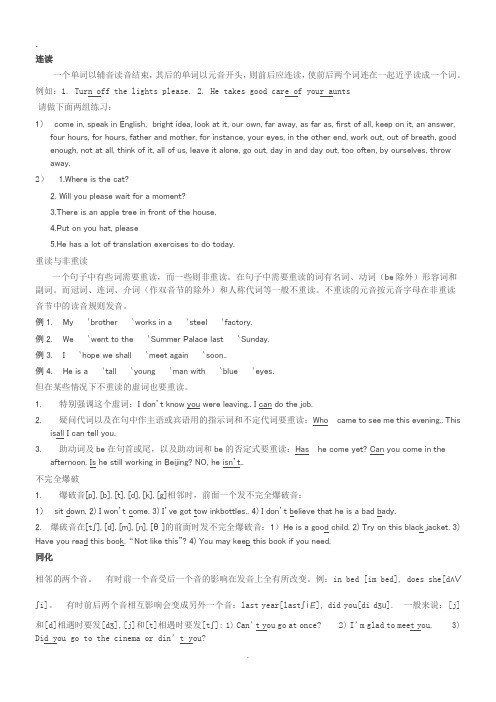
连读一个单词以辅音读音结束,其后的单词以元音开头,则前后应连读,使前后两个词连在一起近乎读成一个词。
例如:1. Turn off the lights please. 2. He takes good care of your aunts请做下面两组练习:1)come in, speak in English, bright idea, look at it, our own, far away, as far as, first of all, keep on it, an answer, four hours, for hours, father and mother, for instance, your eyes, in the other end, work out, out of breath, good enough, not at all, think of it, all of us, leave it alone, go out, day in and day out, too often, by ourselves, throw away.2) 1.Where is the cat?2. Will you please wait for a moment?3.There is an apple tree in front of the house.4.Put on you hat, please5.He has a lot of translation exercises to do today.重读与非重读一个句子中有些词需要重读,而一些则非重读。
在句子中需要重读的词有名词、动词(be除外)形容词和副词。
而冠词、连词、介词(作双音节的除外)和人称代词等一般不重读。
不重读的元音按元音字母在非重读音节中的读音规则发音。
例1.My`brother`works in a`steel`factory.例2.We`went to the`Summer Palace last`Sunday.例3.I`hope we shall`meet again`soon..例4.He is a`tall`young`man with`blue`eyes.但在某些情况下不重读的虚词也要重读。
语音6. 英语意群、重读、弱读、连读、爆破和语调

Tell~her I miss~her. What wil(l he) [wili]do? Ha(s he) [zi] done~it before?
Mus(t he) [ti] go? Can he [ni] do it? Should he [di] ….? Tell him to ask her…. Lea(ve him) [vim].
Note
如果前词尾辅音与后词尾辅音相同,前辅
音省略。
I was× so happy. I have got× to go. →I have gotta go.(to轻音化为ta) Do~you want× to dance? →do you wanna dance?
(to轻音化为na)
Note
以辅音结尾的单词 + h开头的单词,h不发
I~am Chinese. He~is very friendly to me. She wants to study~English. How~and why did you come here?
She can’t carry~it. It’ll take you three~hours to walk there. The question is too~easy for him to answer.
Did you tell my ‘wife? Did you tell ‘my wife? Did ‘you tell my wife?
We ‘heard ‘John ‘talking. We ‘heard John talking. We heard ‘John talking.
助动词、情态动词和be动词是否有句子重音?
- 1、下载文档前请自行甄别文档内容的完整性,平台不提供额外的编辑、内容补充、找答案等附加服务。
- 2、"仅部分预览"的文档,不可在线预览部分如存在完整性等问题,可反馈申请退款(可完整预览的文档不适用该条件!)。
- 3、如文档侵犯您的权益,请联系客服反馈,我们会尽快为您处理(人工客服工作时间:9:00-18:30)。
Note
▪ 名词、实义动词、形容词、副词、数 词、指示代词、疑问词和感叹词等一 般都重读。
▪ 而冠词、介词、连词和一般性的代词 则不重读。
▪ ‘What ‘s the ‘matter? ▪ The ‘sweater is ‘beautiful. ▪ Your ‘book is on the ‘desk. ▪ He ‘started ‘counting it. ▪ He ‘usually ‘gets up at ‘six o’clock.
耐烦的口气,或表示命令等。 ▪ Are you satisfied? ↘ ▪ Will you take off your hat, please? ↘
▪ 用于罗列中最后一项之前的各项 ▪ For each incomplete sentence, there are four
choices marked A↗, B↗, C↗, and D. ↘ ▪ We study Chinese ↗, history ↗, geography ↗,
▪ That street is two milhat has happened to him? ↘ ▪ Which direction is it to the post office? ↘ ▪ 注意:特殊疑问句有时可用升调表示请别人重复刚说过的话: ▪ What is your major? ↗ ▪ Where shall we go for the holiday? ↗
助动词、情态动词和be动词是否有句子重音?
▪ 1. 助动词、情态动词和be动词一般没有句子重音,但在附加 句中可以重读,在简答句中则必须重读:
▪ He won’t do it, ‘will he? No he ‘won’t. ▪ You can do it, ‘can’t you? Yes, I ‘can. ▪ You were trying, ‘weren’t you? Yes, I ‘was. ▪ 2. 助动词、情态动词和be动词与not连成一词时要重读: ▪ She ‘doesn’t ‘like the ‘weather here. ▪ I ‘can’t ‘speak ‘French。 ▪ They ‘aren’t ‘waiting for us. ▪ He ‘isn’t a tech ‘nician.
▪ Did you tell my ‘wife? ▪ Did you tell ‘my wife? ▪ Did ‘you tell my wife?
▪ We ‘heard ‘John ‘talking. ▪ We ‘heard John talking. ▪ We heard ‘John talking.
▪ 用于祈使句 ▪ Go back to your seat! ↘ ▪ Please do not hesitate to contact me. ↘
▪ 用于感叹句 ▪ What a small world! ↘ ▪ Oh! My poor Mathilde, how you’ve changed! ↘
Language is power! 语言就是力量!
英语句子重音、语 调、连读、弱读、
爆破及意群
句子重音
▪ Must I stick it on myself? ▪ Must I ‘stick it ‘on my’self? ▪ Must I ‘stick it on my’self? 在连贯的话语中,不可能所有的词都同样重要, 必然有些词较为关键,有些词则相对次要一些。 一般来说,关键词需要重读,这就是句子重音, 而其他词则不必重读。
语调
▪ 英语语调主要有降调、升调和平调三大类。 ▪ 不同的语调可以表示说话人不同的态度和
不同的隐含意思。 ▪ 英语中同一句话采用不同的语调会产生截
然不同的语意概念。如“Yes”。 ▪ 语调具有强烈的感情色彩,它使语言更富
有表现力。
▪ 用于陈述句
降调
▪ I have already read that book. ↘
▪ 用于选择疑问句中“or”之后的部分 ▪ Do you want to ride or walk? ↘ ▪ Would you like coffee or tea? ↘
升调
▪ 用于一般疑问句 ▪ Do you mind if I sit here? ↗ ▪ Can you hand in your compositions today? ↗ ▪ 注意:一般疑问句有时也可用降调,表示一种不
逻辑重音
▪ 句子的重音总是要表现说话人的思想和他 所要表达的意思的重点。有时为了强调, 句子中几乎任何词都可以有句子重音,包 括一些通常没有句子重音的词,这种依说 话者意图重读的音就是逻辑重音。
▪ Are you ‘angry with me? ▪ Are you ‘angry with ‘me? ▪ Are ‘you ‘angry with me?
and English. ↘
▪ 用于陈述句,表示疑问、怀疑、未定、猜测或期待等 ▪ Your really want to do it? ↗ ▪ She might have gone. ↗ ▪ I think so. ↗
▪ 用于置于句首的状语短语或状语从句 ▪ After dinner ↗, I read a magazine and made telephone
▪ 3. be用在一般疑问句句首时,重读与否均可: ▪ ‘Is he a ‘worker? ▪ Is he a ‘worker?
▪ 比较句中的重音 ▪ 在比较句中,重音落在as或than后的代(名)词上: ▪ This is better than ‘that. ▪ John is taller than ‘Bill. ▪ She’s as happy as a ‘lark. ▪ He’s as sly as a ‘fox.
calls. ↘ ▪ While you were writing letters ↗, I was reading a book. ↘ ▪ 用于并列句的第一个分句,表示句子还未说完 ▪ My fever is gone ↗, but I still have a cough. ↘ ▪ My major is English ↗, and I like it. ↘ ▪ 用于委婉祈使句 ▪ Excuse me, sir ↗. Can you help me? ↗ ▪ 用于称呼语 ▪ Mrs. Smith ↗, this is Tom Jones. ↘
